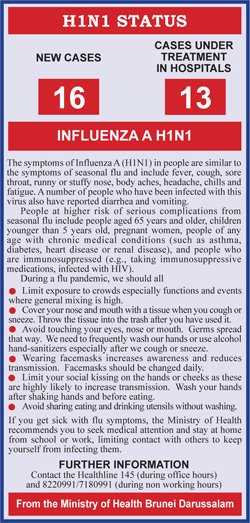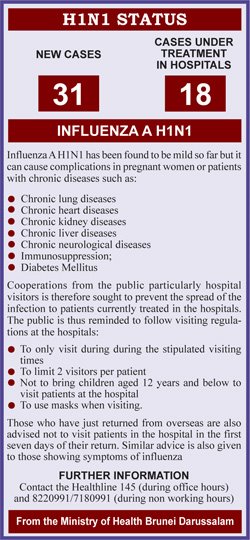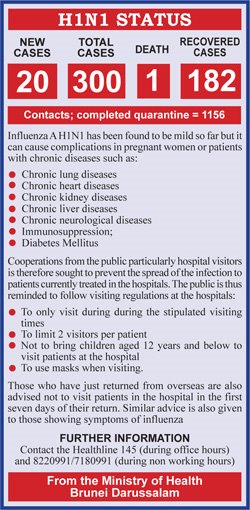Borneo Bulletin, 20 July 2009
Q1: What will happen to the people who are resistant to Tamiflu?
A: Instead of a person being resistant to Tamiflu, it is more likely that the person cannot tolerate the side effects of the medication.
The Influenza virus, including H1N1 can be resistant to Tamiflu and this has been reported to occur already but only in small number.
This is very likely to increase with time and increasing use of the medications, especially when used widely and inappropriately (this problem also apply to antibiotics).
This is already occurring in Japan and America where resistant type seasonal Influenza is increasing.
So far, despite being infected with Tamiflu resistant H1N1, these patients had recovered and no death had yet been reported.
However, it uncertain how people with significant chronic conditions such as kidney failure or chronic chest problem will fare but it is likely, they will fare less well.
Q2: How easy is it to catch the virus (Influenza A H1N1)?
A: Based on current knowledge, Influenza A H1N1 is behaving like the normal Influenza A or B that cause seasonal flu (the type of 'selesma' that we all get).
With regard to this particular strain, it is considered infectious, meaning it can be easily caught.
Spread of virus that cause flu like illness including Influenza A H1N1 is through contacts with contaminated droplets or secretion that is produced through sneezing, coughing and kissing, among others.
This is why it is important to practice good hygiene such as covering nose and mouth when coughing and sneezing, regular hand washing and keeping environment clean.
Q3: When is the onset of symptoms and how long do they last?
A: For person affected by the Influenza A H1N1 and who are experiencing symptoms, these usually occur within a few days of catching the virus.
In most cases, the symptoms subside within the fifth day.
Symptoms lasting longer than this may suggest additional bacterial infection where patient may start coughing up green phlegm.
The symptoms experienced are exactly the same as the type of selesma that everyone experienced before.
You should see a doctor if this happens or if your symptoms seem to get worst.
Based on experience with normal Influenza A/B, treatment with Tamiflu usually shortened the illness by one to two days only.
Q4: Are we prepared for the second wave?
A: During a pandemic, there are usually multiple waves. This period usually range from four to six months due to seasonal changes in the northern and southern hemispheres.
If the second wave is caused by the same virus that caused the initial wave, then we will certainly be more prepared due to the experiences gained from managing the first wave.
However, if there are mutations of the virus, then we may not be as prepared.
Virus mutations may lead to differences in the course of illness and responses to treatment, that is, it could be milder or it could be more severe.
Despite this, lessons learnt from the first wave will certainly make us more prepared.
If vaccines become available, then measures can be taken to lessen the impact of the second or subsequent waves as vaccine can provide some protection against the particular virus.
Q5: Is it true that the flu is only harmful if you have a compromised immune system?
A: Generally, anyone with compromised immune system will be more susceptible to any infections, be it due virus, bacteria or fungus.
People with immune compromised system usually have other additional medical conditions that make them less fit to handle any infections.
The reason why Influenza A H1N1 or any virus that causes influenza illness is more dangerous to a person with chronic conditions like lung disorders is because their lung is already damaged.
However, it is also important to remember that even a previously fit and healthy person can have bad outcomes as a result of viral infections.
Q6: Is it safe to visit houses of people being quarantined as suspected cases?
A: Being quarantined means that the patient should not mixed with other people during the quarantine period.
This reduces the risk of spreading the infection to other people.
They should not invite people over and they should also not go out. Doing so would mean breaking quarantine and can be penalised under the quarantine act.
Therefore, it is not advisable to visit a suspected person under quarantine until the quarantine order is lifted or results confirm that the person does not have the infection.
Q7 & 8: Is it true that the virus stays in you forever even though you are cured? Is it true that if you have already contracted the disease, you will be immune to the second wave if it happens?
A: Usually if you're infected by a virus the body produces antibodies to fight the virus. In most cases, the sufferer manages to fight off and clear the body of that virus but the antibodies remain.
This means that if that person is exposed to the virus again, the body recognises it and is able to prevent the body from being re-infected (immunity).
It is important to remember that there are many different viruses out there such as chickenpox, the common cold viruses, the herpes simplex virus which causes cold sores.
Therefore, if you do develop immunity to one type of virus, it doesn't mean you will be immune to all other viruses.
The 'second wave' (and even third wave) of this virus has been predicted to occur by virus experts all over the world including those at the World Health Organisation.
What this means is that after this current first wave settles down there is the possibility that it will emerge again, possibly in a more aggressive form. It is also possible that be it would be a milder form.
The likelihood is that if you have already developed immunity to the milder form in the first wave then you will probably be immune to infection in the second wave.
It is very clear however that we are still learning more about this virus and none of the international experts can be certain how it will behave in the future.
Q9: Will it affect home pets?
A: It is unlikely to affect your home pets because this is now a human virus. This is because all animals, including humans, have different immune (body defence) systems.
Therefore, it actually takes a major change in shape (mutation) for any virus to change its attack mechanisms from one animal to another. This is still a possibility but has not been reported so far.
Q10: Can somebody be a carrier of the virus, without getting sick himself?
A: Most flu sufferers know it! They have high fever, body aches, cough and sneezing and cannot get out of bed.
However, it is occasionally possible to be affected very mildly.
Our experience here in Brunei with confirmed cases has been that most sufferers do feel unwell for a few days but we have also come across people who haven't even known that they have the infection.
These people could be considered carriers and could possibly pass on the infection without knowing it.
We do know that like the normal selesma, symptoms experienced range from very mild to very severe. In fact a large proportion of people affected only have mild symptoms.
(The questions are provided by the general public and the responses are provided by designated clinicians (doctors) involved in the management of the H1N1 outbreak. These clinicians are part of the RIPAS H1N1 Committee, Ministry of Health.)
Wednesday, July 22, 2009
Subscribe to:
Post Comments (Atom)



No comments:
Post a Comment